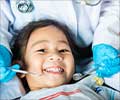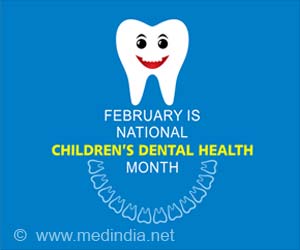Children with autism had lower physiological stress during dental treatment in a sensory-adapted dental environment (SAD) compared to a regular dental environment.

Sensory Adaptations to Improve Physiological and Behavioral Distress During Dental Visits in Autistic Children: A Randomized Crossover Trial
Go to source). Oral health, essential to overall health, is one of the most unmet healthcare needs for children in the United States. Children with special health care needs, such as autism, are at particular risk of oral health disparities.
‘‘Using a sensory-adapted dental environment (SADE) during dental cleanings was a safe and efficacious way to improve dental experiences for autistic children.#autism #dental care’’





With the dramatic increase in autism prevalence (1 in 36 children diagnosed) over the past few decades, oral care in this population is a critical area of study. Autistic children face numerous risks for poor oral health, including difficulties implementing home-based oral care practices and barriers to accessing dental offices.Despite these challenges, there are minimal clinical dental protocols designed specifically to meet the needs of autistic pediatric patients and a reported lack of dental professionals willing and trained to serve the population (2✔ ✔Trusted Source
Oral Health Behaviours of Preschool Children with Autism Spectrum Disorders and Their Barriers to Dental Care
Go to source).
Attention to sensory sensitivities’ effect on oral care is becoming more prevalent in dentistry for autistic children, children with other disabilities, and neurotypical individuals. Therefore, researchers decided to determine whether a sensory-adapted dental environment (SADE) reduces physiological and behavioral distress in autistic children undergoing dental cleanings, compared with a regular dental environment (RDE).
This randomized crossover trial was conducted at a pediatric dentistry clinic in a large urban children’s hospital between May 2016 and April 2022. Coders were blinded to study conditions for physiological but not behavioral measurements.
Autistic children aged 6 to 12 years were identified and invited to participate. Interested families were enrolled consecutively; after confirmation of autism diagnosis, children were randomized. Analysis for this per-protocol study was conducted from April to October 2022.
Advertisement
Enhancing Dental Care for Autistic Children with Sensory-Adapted Dental Environment
The primary outcome was physiological stress, assessed by electrodermal activity. The secondary outcome was behavioral distress measured from video recordings.The results showed that children had significantly lower physiological stress during dental care in SADE compared with RDE, suggesting decreased sympathetic activity and increased relaxation during SADE dental care.
Advertisement
Children in this study also exhibited significantly decreased overt behavioral distress indicators, as measured by frequency and duration of distress behavior, in SADE compared with RDE. This finding supports previous research indicating a positive behavioral impact of SADE (3✔ ✔Trusted Source
Sensory Adapted Dental Environments to Enhance Oral Care for Children with Autism Spectrum Disorders: A Randomized Controlled Pilot Study
Go to source).
As uncooperative behavior is commonly reported as a barrier to care for autistic children, the use of SADE is a potential technique to support care and enhance successful experiences for this population.
Therefore, these results support the potential impact of environmental factors on stress and relaxation immediately upon entering the dental operatory and extending throughout the dental encounter. The use of SADE is relatively inexpensive, scalable, and easy to implement with minimal training.
References:
- Sensory Adaptations to Improve Physiological and Behavioral Distress During Dental Visits in Autistic Children:A Randomized Crossover Trial - (https://jamanetwork.com/journals/jamanetworkopen/fullarticle/2805513)
- Oral Health Behaviours of Preschool Children with Autism Spectrum Disorders and Their Barriers to Dental Care - (https://link.springer.com/article/10.1007/s10803-018-3708-5)
- Sensory Adapted Dental Environments to Enhance Oral Care for Children with Autism Spectrum Disorders: A Randomized Controlled Pilot Study - (https://link.springer.com/article/10.1007/s10803-015-2450-5)
Source-Eurekalert











